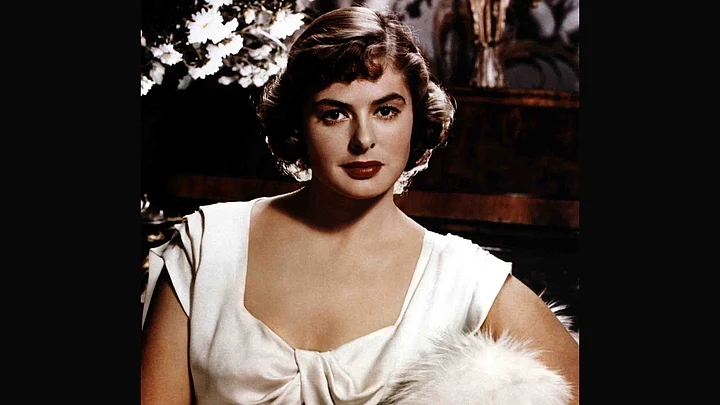Legendary producer David O Selznick called her ‘the most completely conscientious actress’ he had ever worked with, and for the St James Encyclopedia of Popular Culture, she was ‘the ideal of American womanhood’. When the incandescent Swedish beauty landed in American cinema, she brought a sense of believability and charm that was missing from the glam dolls of Hollywood. And the rest is a glorious history.
It’s been a century that Ingrid Bergman blessed us by being born on this planet. To celebrate, we revisit five of her greatest performances.
Notorious (1946)
Alfred Hitchcock’s romantic thriller places Ingrid Bergman between two men, at opposite ends of the spectrum. Bergman’s Alicia loves Cary Grant’s Devlin, and she agrees to seduce Sebastian (Claude Rains), a Nazi spy. Bergman is at her heartbreaking best here, misunderstood by both the men, and it’s her vulnerability that brings forth the perversity of the relationships. Oh, and that broken-unbroken kiss!
Casablanca (1942)
The Citizen Kane of pop culture, everything about the movie has become iconic. This romantic drama set during World War II may have given Humphrey Bogart the most sparkling lines of his career, but its heart belongs to Ingrid Bergman, beating with the same intensity we would feel when in front of the one we so aspire to love.
Autumn Sonata (1978)
The great Swedish director, Ingmar Bergman pitched two of the most iconic Swedish women, Ingrid Bergman and Liv Ullmann, opposite each other, as mother and daughter, in this film of disquiet. This chamber drama is brilliantly intense and emotionally charged with confrontations. Bergman plays the mother, and shows what a seasoned artiste can do, baring herself naked with emotional honesty, hopping from joy to tears, and freeing her character from filmy confines.
Gaslight (1944)
In an oppressive ambience, Bergman plays Paula, a woman driven mad by her husband, Gregory (Charles Boyer). Bergman plays her character with such alarming brilliance that it’s almost impossible to pin down her personality till the finale. George Cukor, known as the ‘women’s director’, uses Bergman as a key element in building the psychologically compressing atmosphere with subtle clues.
Voyage to Italy (1954)
Bergman admired Roberto Rossellini, one of the masters of Italian neorealism, and after watching Paisan (1946) and Rome: Open City (1945), she wrote him a letter offering her services if he should “need a Swedish actress who speaks English very well.” This led to her being cast in his film Stromboli (1950), and an affair that became a huge scandal. One of the results of their association, Voyage to Italy, was unfortunately, criminally overlooked. It captures a couple grappling with their declining marriage. In this postwar drama, Rossellini shows a different side to Bergman, the glamorous American star and his muse, gifting her character an existential crisis that’s awash with memories, and disconcerting realizations.
(The
writer is a journalist and a screenwriter who believes in the insanity of
words, in print or otherwise.
Follow him on Twitter: @RanjibMazumder)
(At The Quint, we question everything. Play an active role in shaping our journalism by becoming a member today.)
